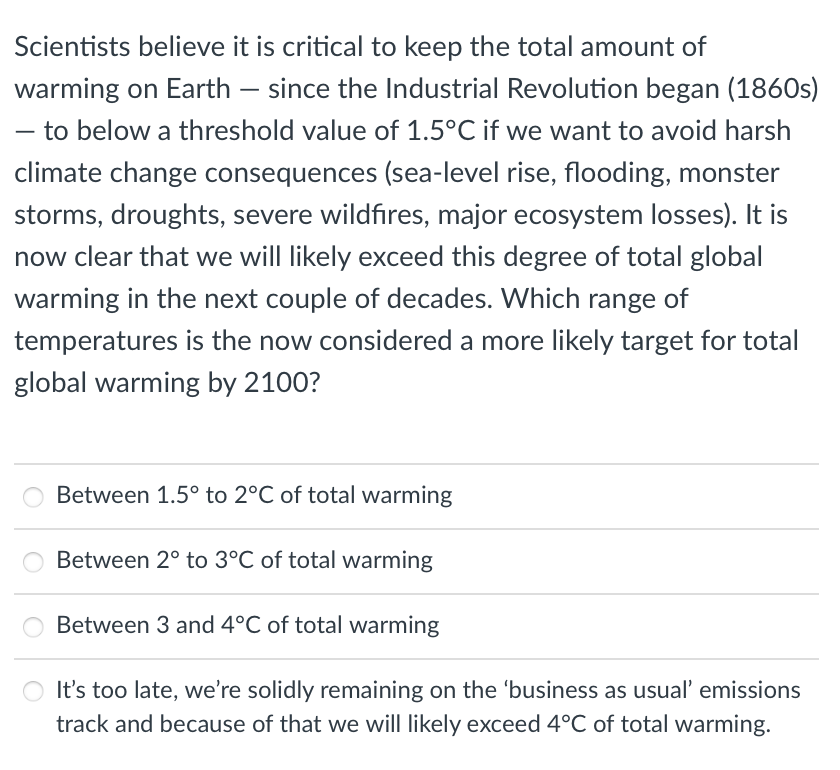Scientists believe it is critical to keep the total amount of warming on Earth - since the Industrial Revolution began (1860s) - to below a threshold value of 1.5°C if we want to avoid harsh climate change consequences (sea-level rise, flooding, monster storms, droughts, severe wildfires, major ecosystem losses). It is now clear that we will likely exceed this degree of total global warming in the next couple of decades. Which range of temperatures is the now considered a more likely target for total global warming by 2100? Between 1.5° to 2°C of total warming Between 2° to 3°C of total warming Between 3 and 4°C of total warming It's too late, we're solidly remaining on the 'business as usual' emissions track and because of that we will likely exceed 4°C of total warming.
Scientists believe it is critical to keep the total amount of warming on Earth - since the Industrial Revolution began (1860s) - to below a threshold value of 1.5°C if we want to avoid harsh climate change consequences (sea-level rise, flooding, monster storms, droughts, severe wildfires, major ecosystem losses). It is now clear that we will likely exceed this degree of total global warming in the next couple of decades. Which range of temperatures is the now considered a more likely target for total global warming by 2100? Between 1.5° to 2°C of total warming Between 2° to 3°C of total warming Between 3 and 4°C of total warming It's too late, we're solidly remaining on the 'business as usual' emissions track and because of that we will likely exceed 4°C of total warming.
Applications and Investigations in Earth Science (9th Edition)
9th Edition
ISBN:9780134746241
Author:Edward J. Tarbuck, Frederick K. Lutgens, Dennis G. Tasa
Publisher:Edward J. Tarbuck, Frederick K. Lutgens, Dennis G. Tasa
Chapter1: The Study Of Minerals
Section: Chapter Questions
Problem 1LR
Related questions
Question

Transcribed Image Text:Scientists believe it is critical to keep the total amount of
warming on Earth - since the Industrial Revolution began (1860s)
- to below a threshold value of 1.5°C if we want to avoid harsh
climate change consequences (sea-level rise, flooding, monster
storms, droughts, severe wildfires, major ecosystem losses). It is
now clear that we will likely exceed this degree of total global
warming in the next couple of decades. Which range of
temperatures is the now considered a more likely target for total
global warming by 2100?
Between 1.5° to 2°C of total warming
Between 2° to 3°C of total warming
Between 3 and 4°C of total warming
It's too late, we're solidly remaining on the 'business as usual' emissions
track and because of that we will likely exceed 4°C of total warming.
Expert Solution
This question has been solved!
Explore an expertly crafted, step-by-step solution for a thorough understanding of key concepts.
This is a popular solution!
Trending now
This is a popular solution!
Step by step
Solved in 2 steps

Recommended textbooks for you

Applications and Investigations in Earth Science …
Earth Science
ISBN:
9780134746241
Author:
Edward J. Tarbuck, Frederick K. Lutgens, Dennis G. Tasa
Publisher:
PEARSON

Exercises for Weather & Climate (9th Edition)
Earth Science
ISBN:
9780134041360
Author:
Greg Carbone
Publisher:
PEARSON

Environmental Science
Earth Science
ISBN:
9781260153125
Author:
William P Cunningham Prof., Mary Ann Cunningham Professor
Publisher:
McGraw-Hill Education

Applications and Investigations in Earth Science …
Earth Science
ISBN:
9780134746241
Author:
Edward J. Tarbuck, Frederick K. Lutgens, Dennis G. Tasa
Publisher:
PEARSON

Exercises for Weather & Climate (9th Edition)
Earth Science
ISBN:
9780134041360
Author:
Greg Carbone
Publisher:
PEARSON

Environmental Science
Earth Science
ISBN:
9781260153125
Author:
William P Cunningham Prof., Mary Ann Cunningham Professor
Publisher:
McGraw-Hill Education

Earth Science (15th Edition)
Earth Science
ISBN:
9780134543536
Author:
Edward J. Tarbuck, Frederick K. Lutgens, Dennis G. Tasa
Publisher:
PEARSON

Environmental Science (MindTap Course List)
Earth Science
ISBN:
9781337569613
Author:
G. Tyler Miller, Scott Spoolman
Publisher:
Cengage Learning

Physical Geology
Earth Science
ISBN:
9781259916823
Author:
Plummer, Charles C., CARLSON, Diane H., Hammersley, Lisa
Publisher:
Mcgraw-hill Education,